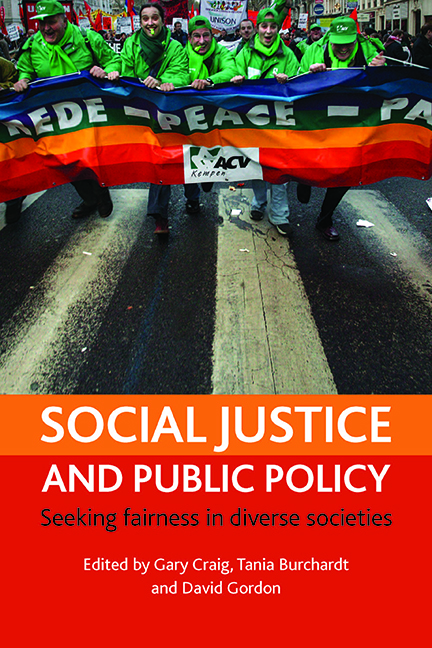Book contents
- Frontmatter
- Dedication
- Contents
- Acknowledgements
- Notes on contributors
- Introduction
- one Social justice and public policy: a view from political philosophy
- two Social justice and public policy: a social policy perspective
- three Multiculturalism, social justice and the welfare state
- four Structural injustice and the politics of difference
- five Recognition and voice: the challenge for social justice
- six Globalisation, social justice and the politics of aid
- seven Social justice and the family
- eight Children, policy and social justice
- nine Social justice in the UK: one route or four?
- ten Monitoring inequality: putting the capability approach to work
- eleven The limits of compromise? Social justice, ‘race’ and multiculturalism
- twelve Understanding environmental justice: making the connection between sustainable development and social justice
two - Social justice and public policy: a social policy perspective
Published online by Cambridge University Press: 19 January 2022
- Frontmatter
- Dedication
- Contents
- Acknowledgements
- Notes on contributors
- Introduction
- one Social justice and public policy: a view from political philosophy
- two Social justice and public policy: a social policy perspective
- three Multiculturalism, social justice and the welfare state
- four Structural injustice and the politics of difference
- five Recognition and voice: the challenge for social justice
- six Globalisation, social justice and the politics of aid
- seven Social justice and the family
- eight Children, policy and social justice
- nine Social justice in the UK: one route or four?
- ten Monitoring inequality: putting the capability approach to work
- eleven The limits of compromise? Social justice, ‘race’ and multiculturalism
- twelve Understanding environmental justice: making the connection between sustainable development and social justice
Summary
Introduction
From a small child protesting that ‘It's not fair’, to a former Enron employee, commenting on a senior executive who had been urging employees to invest their savings in Enron stock at the same time as he was unloading his, saying ‘It was unjust’, a concern for social justice dominates much of everyone's lives. ‘Social justice’ is a term that is both normative and prescriptive: situations are assessed in terms of their social justice and actions are guided by concepts of social justice.
Social policy is to a large extent concerned with social justice. For example, in Britain, politicians commonly espouse social justice: the leader of the Labour Party set up a Commission on Social Justice in 1992 and a former leader of the Conservative Party set up a Social Justice Policy Review in 2005. For many social democratic politicians the pursuit of social justice is a genuine and central political objective; certainly, few politicians espouse social injustice. Whether social justice requires some degree of equality of outcomes or requires equality of opportunities has been a continuing debate. Gordon Brown stated that ‘real equality in life chances is what government seeks’ (Leonard, 1999, p 46).
The very ambiguity of the term ‘social justice’ – a ‘feel good’ term that almost all can subscribe to – may of course be one reason why it is useful for many engaged in persuasion, the manipulation of public opinion and the solicitation of electoral support. For practitioners of social policy, concerned with practical policies reflecting many motivations, social justice is often a remote reference point, as abstruse as a lecture on thermodynamics to someone on the footplate of a steam engine. But if what is meant by social justice is unclear, the destination seen but darkly, then there is little chance of it being achieved.
Social justice tends to be discussed at an abstract, perhaps refined, level by political and economic philosophers. Many political philosophers have attempted to clarify what social justice is or should be. On this, there has not been unanimity of views. The purpose here is not to join in this very extensive debate (Chapter One); shelf-loads of books have been devoted to this task.
- Type
- Chapter
- Information
- Social Justice and Public PolicySeeking Fairness in Diverse Societies, pp. 33 - 52Publisher: Bristol University PressPrint publication year: 2008
- 1
- Cited by

